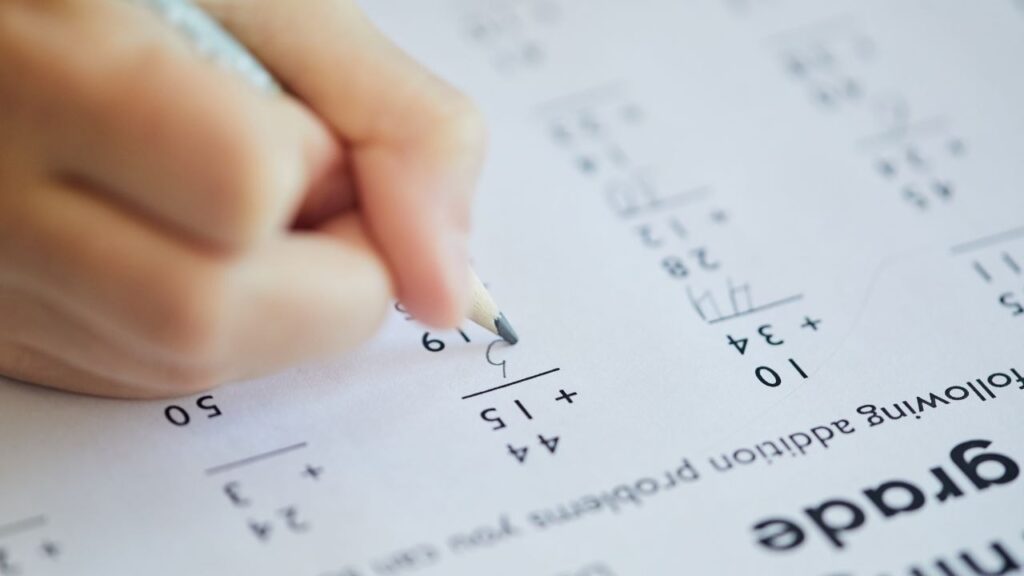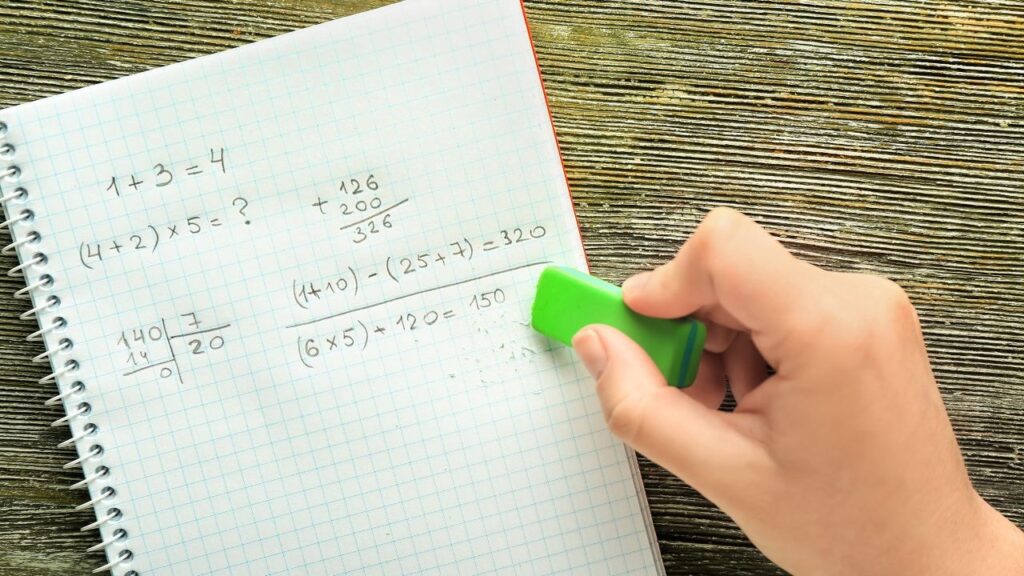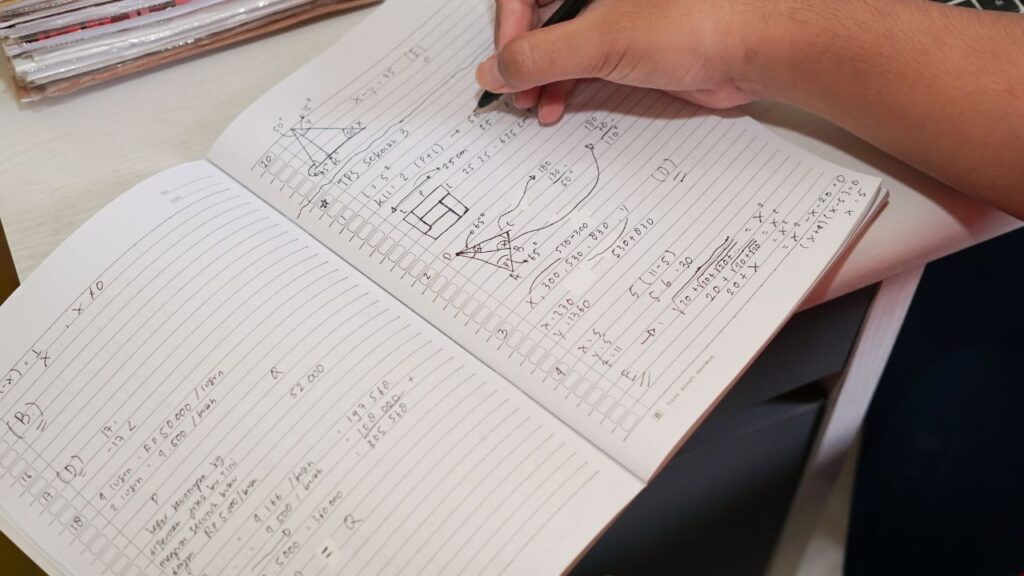Does math feel like a never-ending battle of numbers, formulas, and frustration?
Do you catch yourself staring at your textbook, wishing the answers would magically appear?
You’re not alone. While many students find math challenging, you don’t need to be a genius to get great results!
Math isn’t about talent. It’s about technique—knowing how to study smarter, not harder.
And once you crack the code? It actually starts to make sense (yes, really).
Want to boost your confidence and score higher in exams? Read on to discover 7 proven strategies to help you master math!
Why Is It Important to Master Math?

Before we jump into some tips, let’s tackle the big question: Why does mastering math even matter?
Some of you might be thinking, “Do I actually need to be good at math? Can’t I just get by with the basics?”
Here’s the truth: math isn’t just about numbers—it trains your brain to think logically, solve problems, and make betterdecisions in everyday life.
And in Singapore’s education system, maths plays an even bigger role.
It’s a core subject in major national exams like the PSLE and O-Levels, and your performance directly affects which schools, streams, and future academic paths you’ll qualify for.
Beyond school, strong maths skills open doors to STEM careers, scholarships, and even business-related opportunities.
The earlier you build a solid foundation in math, the smoother your academic journey will be down the line.
What Math Topics Should You Master First?

Now that you know why math matters, you’re probably wondering—where do I even begin?
With so many math concepts and topics covered in school, it’s easy to feel overwhelmed. But here’s something most students aren’t told clearly enough: learning maths is like building a house.
Some are foundational, meaning if you master basic math skills required, everything else becomes much easier.
Before diving into the tricky advanced problem solving, it’s important to build a strong base.
Here are the key topics you should focus on at different levels:
Primary School (P3-P6):
- Fractions, decimals, and percentages
- Ratios and proportions
- Area, perimeter, and volume
- Problem-solving strategies (e.g., model drawing)
Lower Secondary (Sec 1-2):
- Algebra and equations
- Geometry and angles
- Speed, distance, and time calculations
- Graphs and data interpretation
Upper Secondary (Sec 3-4, O-Levels):
- Trigonometry and sine/cosine rules
- Calculus and functions
- Probability and statistics
- Differentiation and integration (for those taking Additional Maths)
The takeaway? If you’re having trouble with new topics, go back and revisit the basics!
Mastering what are considered basic math skills is the key—without them, advanced concepts become much harder to grasp.
7 Strategies for Fast Improvement in Math

It’s one thing to know the important concepts; it’s another to improve your math skills with smart strategies and regular practice.
The good news? You don’t have to struggle alone.
With the right study methods, you can learn faster, sidestep common pitfalls, and maybe even start enjoying math (seriously!).
Here are seven strategies to help you study math and score higher in exams:
1. Understand, Don’t Just Memorise

A lot of students try to memorise formulas and methods without understanding how they work, but this makes it harder to apply them in different situations, especially on questions they have not tackled yet.
Instead, focus on why a concept works—this will help you remember it better and adapt it to different questions.
The better you understand the logic behind math, the less you’ll rely on rote memorisation.
✔ Instead of memorising the formulas, break them down and learn how they are derived.
✔ Ask yourself, “Why does this method work?” whenever you learn something new.
✔ Try explaining the concepts to someone else—if you can teach it, you truly get it.
2. Master the Basics First

Struggling with harder math topics?
The real issue often isn’t the topic itself, but gaps in your foundation knowledge and basic math learning that make everything more complicated.
Before diving into advanced concepts, ensure you’re comfortable with fundamental topics like fractions, algebra, and problem-solving techniques.
✔ Find your weak spots in earlier topics and strengthen them first.
✔ Start with simple math problems before tackling the tougher ones.
✔ Always remember: A strong foundation makes learning advanced maths way easier!
3. Practise, Practise, Practise!

Math is like any other skill—you get better through practice and by doing it consistently.
Just reading through solutions won’t cut it. You need to actively work through problems to build confidence and speed.
Regular math practice also helps you recognise patterns in questions and makes exams feel less daunting.
✔ Solve various question types to expose yourself to different problem-solving approaches.
✔ Use past-year exam papers and timed exercises to improve math skills, speed, and accuracy.
✔ Once you’re feeling confident, push yourself with tougher problems instead of sticking just to the simple basic math problems.
4. Learn from Your Mistakes

Mistakes in math are totally fine—repeating them is the problem.
Many students rush through corrections without fully understanding their errors and what went wrong, which leads to the same mistakes in exams.
Instead, take time to analyse your mistakes carefully and make sure you know how to solve the question correctly next time.
✔ A good hack is to keep an ‘Oops Notepad’ to track common mistakes and how to avoid them.
✔ Always redo incorrect questions from scratch instead of just reading the answers.
✔ Look for patterns and analyse errors—are you misreading questions, making calculation errors, or forgetting formulas?
5. Break Down Hard Problems into Simple Steps

Tricky math questions can be overwhelming, but you can make them easier by breaking them down into smaller, manageable steps.
Instead of trying to solve everything at once, identify what the question is asking and tackle it one step at a time.
This reduces confusion and makes even the hardest problems easier to solve.
✔ Underline key info in the question and identify what you already know—understanding the question is 50% of the solution.
✔ Use diagrams or equations to organise your thoughts before solving.
✔ Work step by step—focus on getting one part right before moving on.
6. Make Maths Fun and Engaging

If math feels boring, you might be studying the wrong way!
Maths becomes much easier when learning feels like a challenge rather than a chore—when the math puzzle finally clicks, it’s incredibly rewarding.
By using the right tools and techniques, like turning it into a game or applying it to real life, you’ll stay motivated and improve faster.
✔ Check out interactive apps and software to make practice more enjoyable.
✔ Study with friends and make it a game—quiz each other and compete on speed.
✔ Relate maths to real-life situations, like shopping discounts or sports statistics.
7. Get Expert Help When Needed

Sometimes, no matter how hard you try, you hit a wall—and that’s when expert guidance can make all the difference.
The goal is to ensure every child learn math in a way that fits their unique learning style. Skilled tutors identify weaknesses, tailor lessons, and help students progress with confidence and clarity.
The key is to find the right support that matches your learning needs and keeps you on track.
✔ Look for those that offer small, focused math class sizes to ensure you get individual attention.
✔ Find math tutor centres with tailored lessons and customised materials that align with your learning pace.
✔ Choose those with proven teaching methods that help students gain confidence and excel in school and exams.
At One Step Journey, we believe that every student deserves personalised guidance to excel in maths.
With our small class sizes, customised lesson plans, and structured approach, we help students strengthen their understanding and build confidence.
Struggling with Maths? Master It Easily with One Step Journey!

You’ve learned the best strategies to improve in maths, but sometimes, having the right guidance makes all the difference.
If you’re still struggling with tough concepts, making careless mistakes, or feeling stuck no matter how much you practise, you don’t have to figure it out alone.
At One Step Journey, we provide small, focused class sizes so you get the attention you need, tailored lessons that match your learning pace, and customised materials designed to strengthen your understanding.
Our proven teaching methods equip students with exam techniques and problem-solving strategies, making even the hardest topics easier to grasp.
With the right support, you can finally gain confidence and see real improvement in your math learning and scores.
Ready to take the next step? Book a trial class today with us today!

